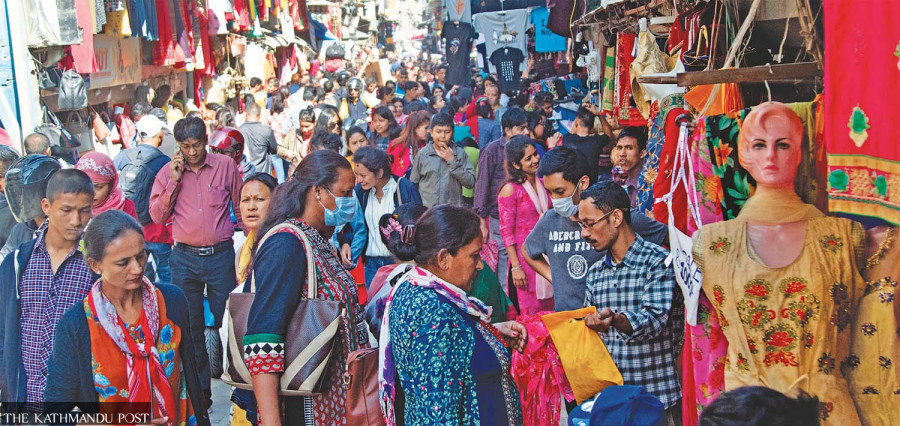Editorial
Save or celebrate?
People don’t have much money to spend this Dashain. But can they at least be optimistic of a better tomorrow?
Dashain seems to have arrived only for children who get to spend a carefree few weeks away from school. For the grown-ups, especially those from middle- and low-income families, the biggest festival this year has been a tightrope walk as they have to balance thrifting and merrymaking. Inflation has crossed the 8 percent mark, walloping people’s purchasing power. At 69th, the country’s standing among the 125 countries reviewed for the Global Hunger Index is nothing to celebrate as we face ‘moderate’ levels of hunger. Even as people were struggling to make their ends meet, the most recent session of the country’s federal parliament could not pass any vital laws, as nearly all its time was spent squabbling over who was to blame for smuggling of gold and selling Nepali nationals abroad as refugees. Little wonder, not many people are in a mood to celebrate.
As per the Nepal Rastra Bank, the consumer price inflation this year stood at 8.19 percent in mid-September, with food and beverage inflation of 9.74 percent and non-food and service inflation of 6.99 percent. With such huge price increments, people are cutting down on daily consumption. Their festival-time consumption is also sure to take a hit: goat meat, which meat lovers relish in Dashain, is going for as much as Rs 1,400 a kilo, keeping it out of reach of all but a tiny section of the population. Non-meat food items are no cheaper. And what is Dashain or Tihar or Chhat if you cannot even satisfactorily feed your family?
While the overall financial health of the state has gotten a notch better this year, with forex reserves increasing and the financial sector stabilising, the problem is, people just don’t have any money to spend. Top government officials have spent much time debunking the myth that Nepal is going ‘Sri Lanka’s way’. It is not, largely due to Nepal’s way better forex reverses. Yet such promises and proclamations are meaningless unless people have adequate disposable income. The problem, as any Nepali on the street will tell you, is not that Nepal has billions of dollars in foreign reserves; it is rather that they, the common folks, have not been paid in months.
When you are running out of cash, the last thing you want to do is spend what little you have on non-essential commodities. This phenomenon is amply demonstrated by the drastic slowdown of all sorts of businesses this Dashain—from meat industry to the purveyors of household electronics—compared to the same period in the previous years.
In the backdrop of consistent financial insecurity, people are compelled to park their money in banks. This contributes to further economic stagnation. The government should, therefore, come up with measures to get more money into people’s hands so that their spending power increases and, with it, the economy gets a boost. This can, for instance, start with lowering the eye-watering interest rates of banks and financial institutions that have arguably contributed the most to damage the country’s business environment. In the long run, the money sitting idly in banks is good for no one. At the start of this festive season, here is hoping that the country’s top state officials and economic policymakers can feel the pain of ordinary folks and will do what is needed to perk their lives. A little empathy will go a long way.




 13.12°C Kathmandu
13.12°C Kathmandu














